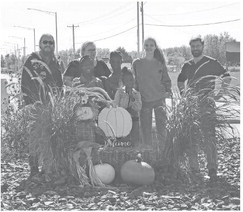“I think both suggestions should fall under the entire county board to decide. Those are major decisions”


one is watching their 401Ks go down and the price of gas going up. “It is important to help employees through that, but it is also important to help taxpayers navigate through,” he said. “Our taxpayers are paying these bills, we can’t forget about them.”
“I think 5% is pretty fair,” Gebauer said, noting the county is losing good employees because of wages.
“What about the taxpayers?” Mildbrand asked. He noted that with the adjustment in the compensation plan some employees could see a 7.5% increase this year. “That is too much,” he said.
“Not everyone is going to get that,” Zenner said. In the end, committee members voted in favor of a compromise increase of 4% with Mildbrand opposed.
Last minute budget cuts
Coming out of the discussion of wages and health insurance committee members then looked at the overall budget picture with a combination of cuts, use of fund balance and short term borrowing to get the levy down and the overall taxes down to the goal of an 8% increase over the current year.
While typically at this point in the budget process, committee members would be tying up loose ends in order to get the budget ready for publication, committee members weren’t finished with making substantial changes.
Mildbrand proposed that rather than applying $200,000 of fund balance to the budget, the county should apply $400,000 and reduce the amount they needed to borrow. He said that in the long term, the answer to the county’s budget problem is to have fewer employees and pay the remaining employees more. He said the best option to do this is through attrition, which he described as being a “friendly departure.”
“I think our committees and this committee need to be really diligent starting now that when a position opens up we question do we really need that position,” Mildbrand said. He called for the county to have a goal of having five less employees by this time next year.
“I think it is possible to do that and not have a reduction in service,” Mildbrand said.
Along that same line, Lewis suggested that with the announced plans for the county surveyor to retire late next spring that the county not rehire for the position and instead look at contracting some of those
services out. In addition, he said there were other areas he thinks the county could save money. He made a motion, seconded by Thums, to withdraw the $30,000 per year the county contributes to the Taylor County Housing Authority. “That was always supposed to be self-supporting,” he said, saying he didn’t believe they should be paying taxpayer money for it. Tied to that, he called for the county to switch to contracting with Northwest Regional Planning Commission to administer the county’s CDBG housing grants which he said would be done at no additional cost to the county.
Zenner questioned how the Housing Authority would be able to survive with the county pulling its funding and disagreed with going to the Spooner-based NWRPC noting that especially for older people having someone to talk with here was important.
Thums disagreed saying they could reduce budget costs without reducing any services and that all the work could be done via telephone or online. “The service will not disappear,” he said.
“I feel it should stay here,” Zenner said. Brandl noted that most of the grants the Housing Authority operates under are in the Housing Authority’s name, those would remain with the Housing Authority. While the county has a representative on the Housing Authority board and it has office space in the courthouse, it is separate from the county as a stand-alone entity.
At this point in the meeting, committee members Soper and Lemke had to leave to go to a land conservation committee meeting. As a result the vote on Lewis’s motion to withdraw the county funding from the Housing Authority passed on a 4 to 1 vote with Zenner opposed.
Lewis was not finished cutting and noted that at about 18,000 acres the Taylor County forest is one of the smallest in the state. He said he checked with other counties and was told Taylor County was overstaffed. He made a motion to cut the department by one employee. Thums seconded the motion. This would leave just one employee in the department.
Brandl estimated this would result in about a roughly $100,000 reduction.
Lewis said he thinks the county would have to do some contracting for things the county is currently doing such as trail maintenance.
“I will not vote for this,” Zenner said. He noted the county has relied on this department for revenue and it has been a good money-maker for the county. He said he felt they should leave well enough alone.
“We are here to look out for the taxpayers,” Thums said supporting making the staffing cut. He said he agreed with Mildbrand’s sentiment of having fewer people and paying them better. “Our function is to run a county,” Thums said. He raised the county’s use of borrowing in the budget and questioned what the interest would be. Brandl said he has already locked in interest rates from local institutions and that with the borrowing being under 90 days, the amount of interest would not be very much.
“I think both suggestions should fall under the entire county board to decide. Those are major decisions,” Mildbrand said.
Zenner defended the use of the borrowing, noting it was not something they were seeking out to do, but it was because the state legislature did not give them the ability to raise the levy as they needed to in order to meet rising costs.
As far as bringing those changes to the full county board, because they are being approved as part of the budget changes, they would not come as a separate line item, but would have to be brought up by a board member to be addressed during the October 26 county board budget session.
Zenner and Mildbrand voted against making the cut to the forestry department staff with Gebauer, Thums and Lewis voting in favor of making the cut. On a voice vote, committee members voted to apply $400,000 of fund balance rather than $200,000 to the budget. While committee members expressed a desire for this to come out of the forestry department’s land acquisition account, any adjustment or spending from that account requires action from the full county board. At the meeting, Brandl said he expected borrowing would be about $700,000 with the changes, although he said it could be less after he factored in the changes made.
— County Board member Scott Mildbrand about proposed cuts to Taylor County Housing Authority and the forestry department.
“We are here to look out for the taxpayers”
— County Board member Rollie Thums supporting a call to cut a position out of the county’s forestry department saying the two-person department is overstaffed.



